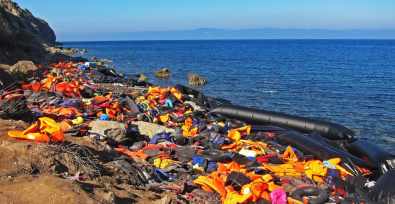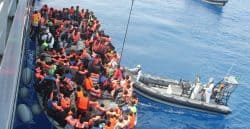In August 2023, a boat carrying people seeking safety broke apart while crossing the English Channel, killing seven. Authorities took the survivors into custody, including Ibrahim, a refugee and modern slavery survivor from Sudan. Today, he is behind bars, accused of being a “smuggler” because he was forced to steer the boat. His case is no anomaly. It reflects a growing trend of governments reframing people on the move as criminals. All the while obscuring the state-created conditions that leave them with no safe alternatives.
“I’m not being treated like a human being”
Ibrahim fled Sudan just weeks before horrific massacres perpetrated by a paramilitary group targeting the Massalit, the minority group he belongs to. Like many displaced people, he crossed into Chad hoping for safety. Instead, he was kidnapped, held for ransom, beaten, and forced into labor when his family could not pay.
He eventually escaped and made his way to Calais, where he sought a route to the UK. But with safe route available, the Channel crossing—dangerous, costly, and controlled by violent networks—seemed like his only option. Smugglers demanded money he didn’t have. When he refused, he was threatened with death.
Ibrahim told InfoMigrants:
They were talking very loudly…they started firing shots. They asked us to carry the boat with the others. When we refused, they started hitting us and said, ‘If you don’t carry the boat, we’ll kill you here.’
Now he is facing charges for “co-piloting” the boat. He is treated no differently than the armed networks that coerce people like him into steering under threat. Despite corroborating testimony, he has spent over two years in custody and risks ten more if convicted.
Criminalization as a political strategy
Legal experts and advocates warn that the justice system is increasingly targeting the wrong people. The individuals steering dinghies—often at gunpoint, or because they simply cannot afford another way to flee—play a minimal role in broader smuggling economies.
A member of the Captain support France collective, a group which supports migrants prosecuted for piloting boats during crossing attempts in the English Channel, said:
Sometimes there are brutal power dynamics and control exerted by certain smuggling networks. Yet prosecuting, arresting, and detaining migrants for two years for piloting a Zodiac is targeting the wrong people.
Importantly, this targeting violates Article 5 of the UN Protocol against the Smuggling of Migrants. The Article explicitly protects migrants from criminalization for their own movement. Yet governments across Europe and the UK actively erode these protections, expanding the definition of “smuggling” so broadly that they treat people fleeing for their lives—sometimes even children—as organized criminals.
“It would have been better to die”
The Paris prosecutor’s office is making no distinction between the criminal smugglers and Ibrahim. Conveniently, they ignore that he acted under the threat of a gun. And despite numerous witness testimonies and clear evidence of forced labor, he stands accused of “crimes” as “part of an organized group.” If found guilty, he faces up to ten years in prison for manslaughter, as well as aiding and abetting illegal entry, stay or transit.
Ibrahim shared:
I came to Europe because here there are laws. Here, there is humanity. Yet once again…I feel like I’m not being treated like a human being and that I don’t have the right to live like others. Sometimes…I began thinking it would have been better to die in the shipwreck rather than survive.
Ibrahim’s story illustrates a Europe-wide trend. People fleeing persecution and conflict—including children, torture survivors, and trafficking victims—are being charged with “facilitation” or “illegal arrival.” Authorities criminalize them for acts as basic as steering a boat or helping others stay alive.
The only way to reduce reliance on dangerous journeys—and protect people from exploitation—is to create accessible, humane, and safe pathways for migration. Until governments address their role in producing migration precarity and stop criminalizing people on the move, tragedies like the one Ibrahim survived will continue.
Add your voice to demand safe routes, not scapegoats, and a system that protects people rather than punishes them for seeking safety.







Freedom United is interested in hearing from our community and welcomes relevant, informed comments, advice, and insights that advance the conversation around our campaigns and advocacy. We value inclusivity and respect within our community. To be approved, your comments should be civil.
People fleeing violence and life threats after having suffered numerous attacks deserve better. Solidarity and humane treatment, please!